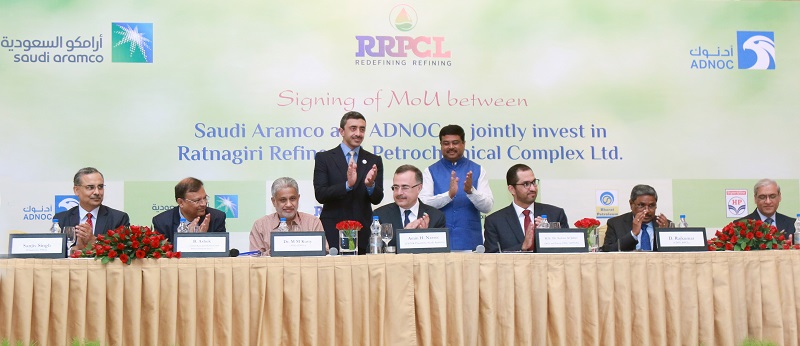

Abu Dhabi National Oil Company (Adnoc) has signed a memorandum of understanding (MoU) with Saudi Aramco and a consortium of Indian state refiners to invest in a planned $44bn integrated refinery and petrochemical complex on India’s west coast.
“Saudi Aramco and Adnoc will together hold [a] 50 per cent stake. The terms are being discussed,” Aramco CEO Amin Nasser was quoted by Indian media reports as saying, after inking the pact in New Delhi on 25 June.
Whether Adnoc will buy exactly half of Aramco’s stake is not yet known.
With the signing of the MoU, Adnoc joins Aramco in the project near Ratnagiri in India’s Maharashtra state, which is scheduled to be commissioned in 2025.
The Indian consortium, consisting of Indian Oil Corporation, Hindustan Petroleum Corporation and Bharat Petroleum Corporation, will own the other 50 per cent stake in the downstream complex, thought to be the largest of its kind in the world.
With Adnoc coming into the fold, the stakeholders are understood to have formally established a holding company named Ratnagiri Refinery and Petrochemicals Complex Limited (RRPCL), which will build and operate the project.
A pre-feasibility study to determine the project’s overall configuration will now be jointly executed by the parties, Adnoc said in a press release.
Adnoc had reportedly been considering a share in the project for some time and was previously slated to sign this pact in May on the sidelines of its Downstream Forum in Abu Dhabi, which Indian oil minister Dharmendra Pradhan attended.
However, the signing of the MoU coincided with UAE Minister of Foreign Affairs Sheikh Abdullah Bin Zayed al-Nahyan’s week-long tour of six Indian cities that began this week.
Sheikh Abdullah and Pradhan presided over the event in which the agreement was signed by Aramco CEO Nasser, UAE Minister of State and Adnoc CEO Dr Sultan Ahmed Al Jaber and the executive leaders of the Indian firms.
Aramco signed an agreement in April to take a stake of up to 50 per cent in the project to be built along the country’s Arabian Sea coastline.
At the signing of the agreement in April, Aramco stated that it would seek to bring another strategic investor on board to dilute some of its equity stake.
The project includes a 1.2 million barrels a day (b/d) refinery integrated with petrochemical facilities, with a total capacity to produce 18 million tonnes a year (t/y) of derivative products.
According to the April agreement, Aramco will supply half of the crude oil required for processing at the Ratnagiri refinery. Adnoc will now supply some of the crude to be processed at the unit.
Saudi Aramco and Adnoc are looking to lock in customers in India for their crude output through the investment as part of their strategic growth plans. Kuwait is also looking to invest in projects in India in return for securing a guaranteed offtake of their crude oil.
Last year, Saudi Arabia invested in refinery projects in Indonesia and Malaysia that came with long-term crude oil supply deals.
Saudi Arabia was the biggest oil supplier to India until 2016, and also in Q1 2017, but has since slipped behind Iraq. Aramco is also keen on investing in India's fuel retailing sector.
The UAE, India’s sixth largest oil supplier, is looking to expand its energy cooperation with New Delhi.
India has a refining capacity of about 233 million t/y, which exceeded the nation’s demand of 194.2 million t/y in 2016 and Q1 2017. According to the International Energy Agency (IEA), this demand is expected to reach 458 million t/y by 2040 as a result of economic progress.
You might also like...

Lunate acquires 40% stake in Adnoc Oil Pipelines
26 April 2024

Saudi Arabia's Rawabi Holding raises SR1.2bn in sukuk
26 April 2024

Iraq oil project reaches 70% completion
26 April 2024

Samana announces $272m Dubai Lake Views project
26 April 2024
A MEED Subscription...
Subscribe or upgrade your current MEED.com package to support your strategic planning with the MENA region’s best source of business information. Proceed to our online shop below to find out more about the features in each package.




